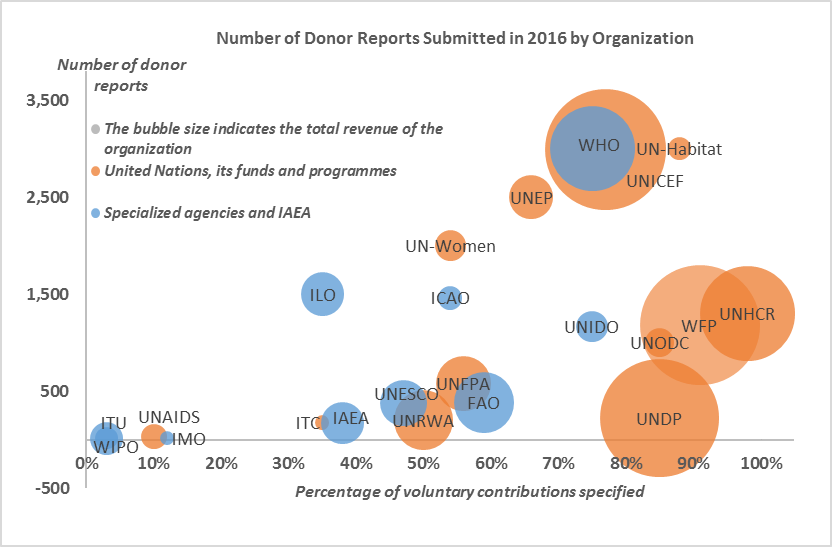- English
- Français
- Español
- 中文
- Русский
- عربي
Review of donor-reporting requirements across the United Nations system (JIU/REP/2017/7)
The rise in voluntary contributions, most of which is specified (or earmarked), over the past two decades has been dramatic. In the United Nations system, it amounted to about 70 per cent of total revenue in 2015. Most donors demand detailed individual reports, financial and programmatic, on the activities undertaken utilizing their earmarked contributions. This reporting is in addition to the organization’s corporate reporting to its governing bodies. Donors stipulate specific requirements that vary significantly in terms of format, detail and periodicity, resulting in a significant rise in individual donor reports. The number of reports on an annual basis often runs into hundreds and even thousands for many organizations. In addition, there has been an increase of informal or ‘soft’ reporting since many donors request additional information, supporting documentation, briefings, email updates or field visits. Providing a multitude of individual reports and maintaining all the underlying systems necessary for producing these reports come with additional transaction costs.
The JIU report identifies ways to improve donor reporting, better address donor needs and requirements, and enhance the standing of the United Nations system as a responsive and valuable partner. It explores possibilities for standardization and streamlining, including developing a common reporting template. The report contains seven formal recommendations, two of which are addressed to the governing bodies and five to the executive heads. It also includes 15 informal or “soft” recommendations as additional suggestions to both the organizations and the donors for effecting improvements.
The report recommends, inter alia, that organizations should engage with donors in a dialogue at the strategic level in line with Secretary-General’s proposal for a “Funding Compact”. In the spirit of partnership, views of both organizations and donors should be taken into account, notably donors’ expectations for greater effectiveness, transparency and accountability on system-wide results. One of the critical elements of the dialogue should be the adoption of donor reporting templates and accommodating the common information needs, demands and requirements of donors and the regulatory frameworks and capacities of the organizations. During the negotiation for individual contributions, organizations and donors should agree in the outset on the needs and demands, their feasibility and the attendant resource implications, including for ad hoc information and reporting requests. All relevant offices, notably finance and legal, should be consulted in a timely manner to ensure compliance with rules, regulations and policies. Appropriate guidance and training on donor reporting, periodically updated in line with changing donor needs, will foster compliance with the organization’s rules and provisions, and assure uniformity of reporting conditions accepted across the organization and hence coherence of reporting. Executive heads should encourage better access to, and dissemination of, information concerning donor reporting and maintain a corporate repository for all contribution agreements and donor reports. Defining a minimum threshold for contributions below which only standard reporting would be provided, together with methodologies for calculating reporting costs, is suggested. Organizations should ensure that their policies for the management of voluntary contributions are adequate, that they possess robust project management systems, and that their ERP and other management information systems possess the necessary functionalities for such work. The risks related to donor reporting need to be mitigated, and quality assurance processes for donor reports should be strengthened.
Organizations should treat reporting to donors as an effective tool for resource mobilization and put in place measures for strengthening partnerships so that reporting is perceived as a continuous process of building lasting relationships with partners. Robust and adequate oversight functions and reports have the potential to enhance donor confidence and reduce assurance needs that donors seek from organizations through project-specific, detailed and comprehensive reports.


